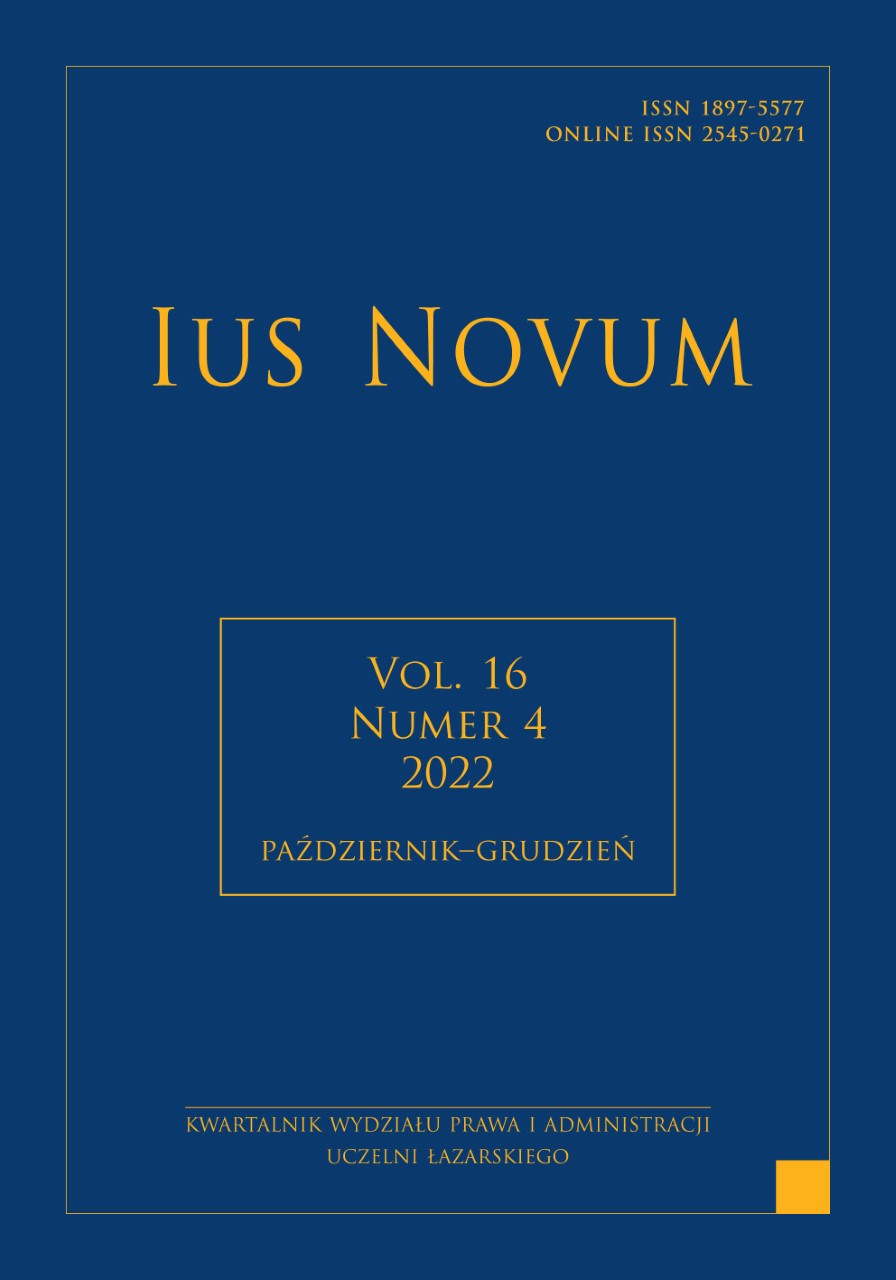Abstract
The article is a review and is devoted to the issue of therapeutic security measures in the Fiscal
Penal Code, i.e. therapy, addiction therapy and stay in a psychiatric institution. The measures
in question are fully regulated in the provisions of the Penal Code, in Articles 93b–93g recited
under Article 20 § 2 of the Fiscal Penal Code on the basis of fiscal penal law. The above
provisions concern the general premises and rules of adjudication, subjective adjudication
criteria, the time of adjudication and the use of therapeutic precautionary measures, and the
obligations of the perpetrator against whom therapy, addiction therapy or stay in a psychiatric
institution was ordered, which corresponds to the structure of the publication. Due to the
lack of an autonomous regulation in the provisions of the Fiscal Penal Code with regard to
the discussed safeguards, the problem of the appropriate application of the above-mentioned
provisions of the Criminal Code in fiscal penal law and the actual suitability of therapeutic
safeguards in this branch of law arises. The aim of the article is therefore to analyze articles
93b–93g of the Criminal Code and attempt to assess whether the adoption of these provisions on the ground of fiscal penal law has been successful, and to verify the research hypothesis
that therapy, addiction therapy and stay in a psychiatric institution play a significant role in
fiscal penal law.
The subject of the analysis are legal regulations and statements of the doctrine. The article
contains considerations concerning the normative and dogmatic sphere, and not the sphere of
judicial application of the law. However, the study is not devoid of references to practice, but
is limited only to the statements of the judicature. The research is national in nature. When
presenting the topic, the authors used the analysis of legal texts, dogmatic analysis and the
analysis of the Supreme Court and appellate courts. Therefore, the title issue was presented
in a normative, dogmatic and partly practical aspect.
References
Bojarski T. (red.), Kodeks karny. Komentarz, LEX 2016.
Giezek J. (red.), Kodeks karny. Część ogólna. Komentarz, WKP 2021.
Góralski P., Terapia sprawców czynów zabronionych jako forma środka zabezpieczającego (art. 93a § 1 pkt 2 k.k.), „Prokuratura i Prawo” 2019, nr 2.
Grześkowiak A., Wiak K. (red.), Kodeks karny. Komentarz, Legalis 2021.
Królikowski M., Zawłocki R. (red.), Kodeks karny. Część ogólna. Komentarz do artykułów 1–116, Legalis 2017.
Lachowski J. (red.), Kodeks karny wykonawczy. Komentarz, Legalis 2021.
Lelental S., Kodeks karny wykonawczy. Komentarz, Legalis 2020.
Małecka-Kowalczyk K., Katalog środków zabezpieczających w Kodeksie karnym skarbowym, „Probacja” 2015, nr 4.
Mozgawa M. (red.), Kodeks karny. Komentarz aktualizowany, LEX 2020.
Mozgawa M. (red.), Kodeks karny. Komentarz aktualizowany, LEX 2022.
Sawicki J., Skowronek G., Prawo karne skarbowe. Zagadnienia materialnoprawne, procesowe i wykonawcze, Warszawa 2021.
Skowronek G., Kodeks karny skarbowy. Komentarz, Legalis 2020.
Stefański R.A., Środki zabezpieczające w znowelizowanym Kodeksie karnym, „Opolskie Studia Administracyjnoprawne” 2016, nr XIV/1.
Stefański R.A. (red.), Kodeks karny. Komentarz, Legalis 2021.
Tużnik M.R., Administracyjne środki zabezpieczające w Kodeksie karnym skarbowym, „Ius Novum” 2021, nr 2.
Zgoliński I. (red.), Kodeks karny skarbowy. Komentarz, LEX 2018.

